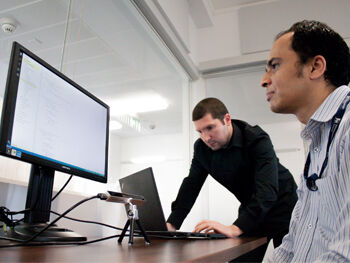University News Last updated 16 May 2019

Microsoft and Birmingham City University are developing new technology to help people with disabilities become more independent in the workplace.
As a grantee of Microsoft’s AI for Accessibility program, Birmingham City University is developing a prototype technology system that enables people with limited mobility to control computers using voice commands and the movement of their eyes.
This technology aims to enhance an individual’s productivity and efficiency in order to unlock a range of careers by removing the need for a mouse and keyboard. When complete, this solution could help pave the way for increased participation in professions like coding, web development and computer programming—which will also contribute to filling key nationwide skills gaps.
“People who are unable to use a mouse or keyboard can often find themselves excluded from certain technical professions, and we are exploring ways to remove some of those barriers,” said Dr. Chris Creed, Senior Lecturer in Human-Computer Interaction at Birmingham City University, who will lead the research project.
Dr. Creed and a team of researchers are currently developing the first iteration of this system. The prototype will integrate voice commands with eye tracking technologies to allow users to efficiently write, edit, and manipulate code.
In collaboration with organizations such as Beaumont College (a large special needs college based in Lancaster, UK), the researchers are committed to working directly alongside people with limited mobility to ensure their tool upholds an inclusive design from start to finish.
Fil McIntyre Lead Assistive Technologist at Beaumont College said: “This new project could make a major difference to people who may otherwise be excluded from certain occupations and opens up a range of new opportunities to them.”
“We are pleased that learners with complex access needs will be able to collaborate with the researchers working on the project and help make sure we work towards a product which has the capacity to genuinely change lives.”
Richard Southorn, Head of Workplace Adjustment Services at Remploy which specialises in connecting people with disabilities with employment, said: “Improving access to jobs is of the utmost importance if we are to work towards a more equal society which provides opportunities for people with disabilities. It is fantastic to see two organisations collaborating on a scheme like this which can open doors to tech careers for millions of people across the globe.”
AI for Accessibility is Microsoft’s $25 million five-year program aimed at harnessing the power of AI to amplify human capability for the more than one billion people around the world with disabilities. It’s a call to action for developers, NGO’s, academics, researchers and inventors to accelerate their work for people with disabilities, focusing on three challenges: Employment, Daily Life and Communication and Connection.
For more information on Microsoft’s AI for Accessibility fund, please visit the fund’s website.